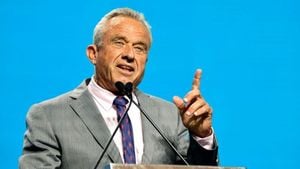Japan’s political scene has recently undergone significant transformations, presenting fresh challenges and opportunities for its new leadership. Prime Minister Shigeru Ishiba, who rose to power amid recent electoral strides by opposition parties, faces the tough reality of governing with diminished political strength and rising regional tensions.
This new dynamic was solidified when Japan found itself governed by a minority coalition following national elections conducted on October 27, 2024. The ruling Liberal Democratic Party (LDP) suffered substantial losses — losing 68 seats — and could not form the majority coalition it hoped for with the Komeito party, which also lost eight seats. On the flip side, opposition parties made gains, with the Constitutional Democratic Party (CDP) now commanding 148 seats, and the Democratic Party for the People (DPFP) rising from seven to 28 seats, showcasing shifting voter sentiments.
Under these circumstances, Ishiba, viewed as a potential reformer, was thrust to the forefront. He did not anticipate this fractured political climate when he gambled on dissolving parliament to secure the anticipated majority. Voters turned the tables, delivering his party disappointing outcomes and exposing cracks within LDP leadership, especially with scandals rocking his coalition partners.
Ishiba's ascent coincides with pressing foreign policy challenges, including his participation at both the Asia-Pacific Economic Cooperation (APEC) and G20 summits. Maintaining Japan's defense posture is of utmost importance as the country grapples with the desires of its allies for increased military spending against the backdrop of China’s military rise, North Korean provocations, and Russia’s assertive posture.
A new era in Japanese foreign policy unfolded with the ratification of the Japan-EU Strategic Partnership Agreement on November 1, 2024. This partnership affirms Japan's commitment to broadening its security cooperation scope, beyond traditional military alliances to include sectors such as maritime security, cybersecurity, and countering hybrid threats. This progressive pivot marks a decisive shift toward increased collaborative mechanisms between Japan and the EU, reflecting shared values and mutual strategic interests.
Yet, Ishiba's foreign policy approach must balance maintaining Japan’s alliance with the United States — which remains deeply integral to its national defense strategy — and engaging with the EU on broader initiatives. The connections with Western allies hinge on negotiating budgetary allocations to prevent confusion as the U.S. demands higher defense spending from Japan and others.
With the return of Donald Trump, Japan's foreign relations outlook could take on new dimensions. Expert Tetsuo Kotani predicts Trump may accept North Korea as a nuclear power during his upcoming term, thwarting existing non-proliferation efforts. Juggling diplomatic relationships under Trump's transactional view presents another layer of complexity for Ishiba, as he now has limited experience building bonds likened to those created by former Prime Minister Shinzo Abe.
Trump's cabinet could also lean heavily on hardliners advocating for increased defense commitments from Japan, Taiwan, and the Philippines, igniting pressure wherein Ishiba must navigate calls for higher defense budgets, potentially pushing Japan’s spending beyond even the 2% of GDP it aims for currently.
Ishiba’s administration must contend with the unpredictable nature of international politics against the backdrop of pressing domestic reforms. With opposition parties advocating for policies like raising the tax-free income threshold to assist the middle class, Japan’s socio-economic future hangs delicately on his handling of legislative relations with the fragmented opposition.
The strategic relevance Japan holds as the cornerstone of U.S. policy goals within the Indo-Pacific region cannot be understated. Yet the perceived instability stemming from leadership changes and electoral disappointments has compelled Japan to reassess not only its immediate security commitments but also its long-term strategy concerning military expenditures and increased defense collaboration with both international partners and regional allies.
Japan is historically rooted alongside the U.S. through cooperative defense agreements. The present environment, with rising tensions from North Korea alongside China's technology and military advancements, necessitates diplomatically advanced negotiation skills and quick adaptation strategies. Ishiba must deftly manage defense budget debates on one hand and navigate the expectations of long-time allies on the other.
To address these complex layers, Ishiba is compelled to deliver on political reform swiftly. Legislative agendas entwined with demands from opposition parties will shape how effectively he stabilizes his minority government. Effective dialogue might pave the way for potential meditations on increasing Japanese military capabilities as it strives to meet U.S. demands in the wake of growing regional peril.
At the forefront of Ishiba's aspirations lies the aim to assure the public and the government’s allied powers of Japan's commitment to both economic empowerment and national security. Seen as reform-minded during his campaign, he heads now toward economic policy management his administration needs to fortify public trust and political stability.
Under Ishiba’s watch, Japan’s Parliament has taken significant steps; laying plans for political reform bills, including regulations on political funding and government transparency. Adapting legislative approval mechanisms is key for him to move forward successfully. Ishiba recognized the gravity of the situation and has already signaled his intent to reach out for bipartisan collaboration.
Nonetheless, with rising geopolitical tensions, particularly concerning military dialogue and alliance harmonization related to North Korea and the dominance of China, Japan’s regional stability depends on whether the newly minted PM can overcome significant hurdles presented by both domestic dysfunction and foreign threats.
Looking forward, Ishiba's leadership confronts one of the most challenging diplomatic landscapes Japan has encountered since World War II. Should he navigate these changes effectively, Ishiba might find ways to convert adversities faced by his minority government and progress Japan’s priorities on international platforms.
Time will tell how the new administration balances maintaining Japan’s longstanding commitment to the U.S. and enhancing its engagement with the EU as the country strengthens its defense posture—all against the backdrop of unprecedented political challenges.
For now, it seems Ishiba faces perplexing times. The combination of urgency and strategy, particularly with adjusting to the unexpected moves from Trump’s administration, might herald new dimensions of policy-making intended to affirm Japan's pivotal role within Asia's uncertain political arena. Such circumstances can sow distrust or form stronger ties, depending entirely on Ishiba’s acumen and capabilities as he ascends to the global stage.



